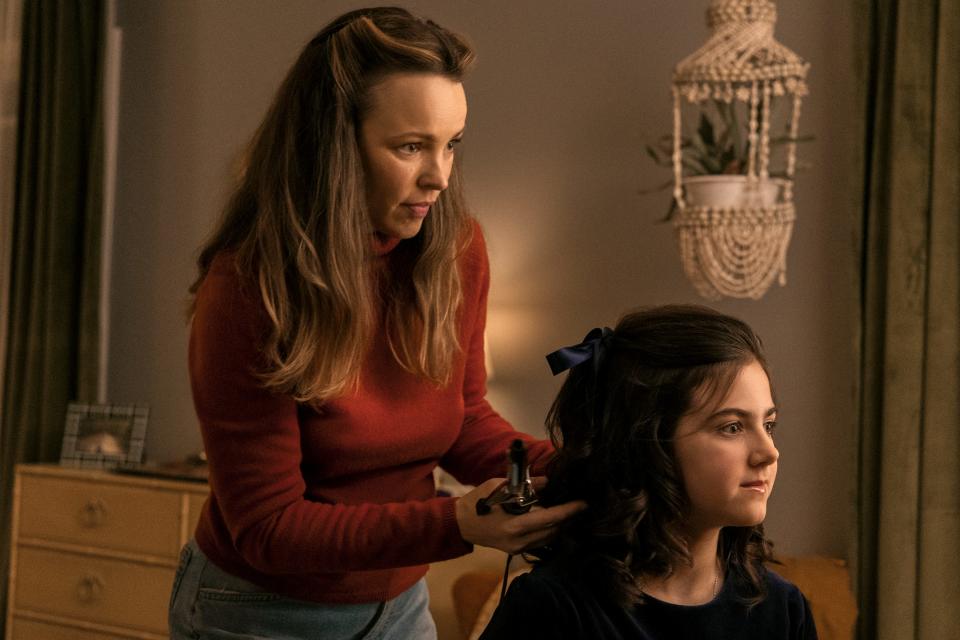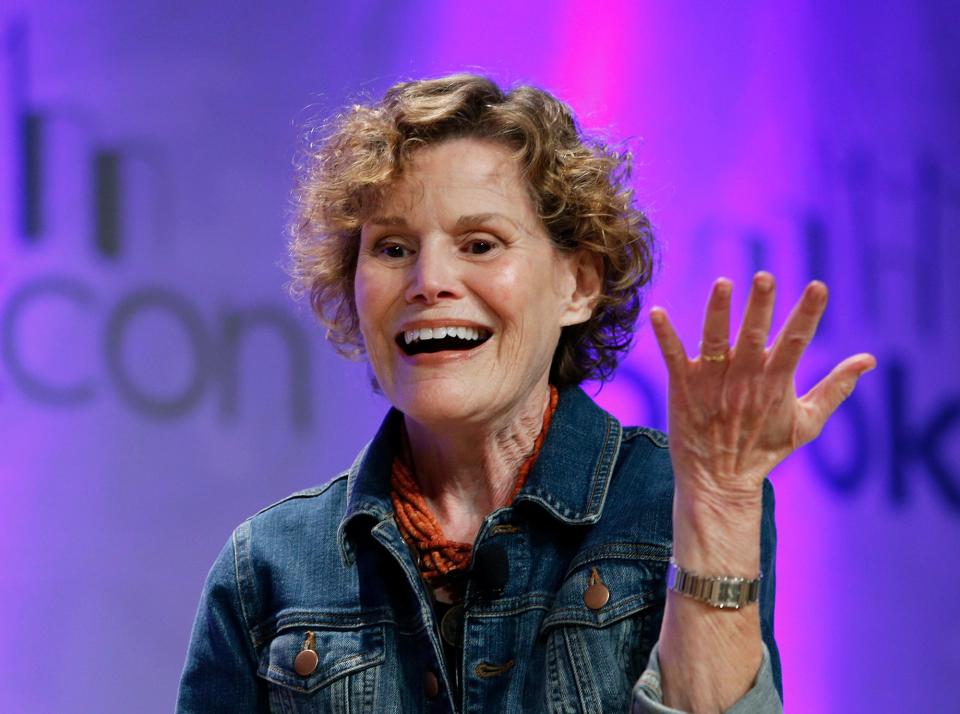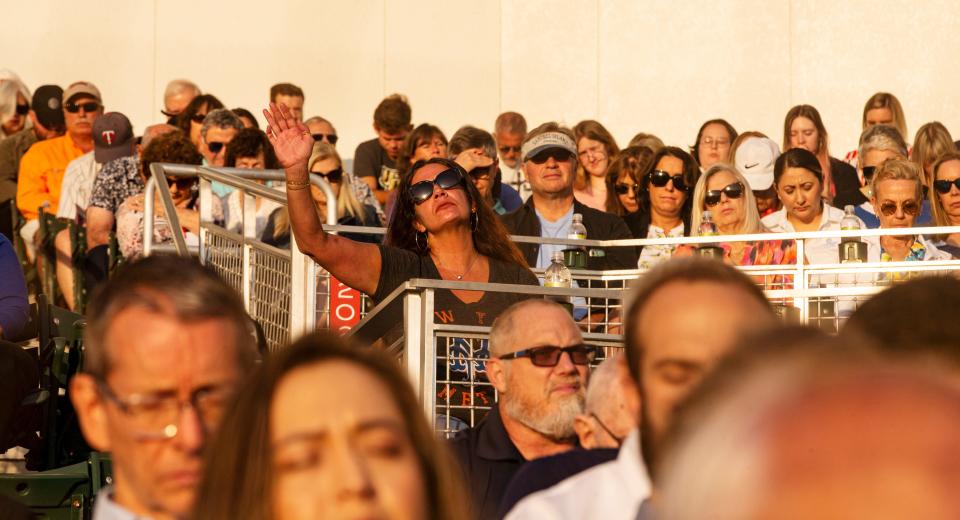Are you there God? NJ's Judy Blume gets how we've lost religion but yearn for connection
- Oops!Something went wrong.Please try again later.
In elementary school, my friends and I huddled over Judy Blume's classic "Are You There God? It's Me, Margaret" like it was a sacred text.
We loved the book, which many of us hid from our mothers, because it dealt with topics that were taboo at the time.
Recently, I ventured out with a crew of friends to AMC Theaters in Ridgefield Park to see the movie version of the book, which finally hit the silver screen last week.
We were not disappointed.

Although the coming-of-age story of 11-year-old Margaret Simon was written in and takes place during the 1970s, its themes are timeless: Her struggles around friendship, identity and growing up are universal motifs that will resonate with most viewers.
But as a reporter covering religion, I was most intrigued by Margaret's spiritual journey.
Blume, who grew up in Elizabeth and has described herself as culturally Jewish, frequently featured Jewish heroines in her stories with whom we could empathize. She's said that organized religious life never really appealed to her but that she spoke to God as a child − much like her protagonist does in the novel from her home in the Jersey suburbs.
Safely ensconced in her bedroom, Margaret, crushed by the news of her family's impending move to the Garden State, begins a conversation with her creator.
"Are you there God? It's me, Margaret Simon. First, I've heard a lot of great things about you..." she says, drawing giggles from the audience.
"Please.... just don't let New Jersey be too horrible."
The intermarriage of Margaret's Christian mother and Jewish father has tragic consequences when her mother's parents reject the union and cut them off.
Read the Series: One in four Americans identify as Nones. Why are millions leaving organized religion?
Column: I can't stop buying Haggadahs for my Seders. Here's why I'm obsessed with collecting them
Margaret's parents opted to raise her with no religion at all.
But when Margaret realizes how little control she has over her life, she turns heavenward. And so begins her chatty relationship with the Almighty that covers everything from family conflict and boys to her body.
"I've got a bra now. It would be nice if I had something to put in it," she opines.
The film reminded me that Blume was years ahead of her time, and not just because she addressed such topics as puberty and teen sexuality.
Today, many pollsters report that organized religion is suffering a decline and that we are seeing the rise of the "Nones," people who don't identify with any particular religious group.
Margaret, in many ways, was a "None," before any sociologist ever came up with the term.
Keeping organized religion at a distance doesn't mean we aren't hungry for spiritual guidance, as Margaret finds. Surveys have shown that though many people rarely step inside a house of worship, they still maintain a connection of sorts with "a divine being."

About four in 10 US adolescents report seldom or never praying. The majority, however, say they pray at least a few times a month, including a quarter who pray on a daily basis, according to a 2020 Pew Research Center survey.
Much of the film depicts Margaret exploring her religious identity. After she reveals to her teacher that she hates religious holidays, he encourages her to research religion for a class project.
"I think it's time for me to decide what to be," she says. She experiments by attending temple with her Jewish grandmother and attending church with her friend, Janie. But neither setting sparks a connection.
When Margaret follows a Catholic classmate into a confessional booth, she finds herself unable to speak to the priest and runs out of the church.
She later complains to God that she doesn't find his presence in any house of worship. "Why do I only feel you when I'm alone?" she says.
She's not the only one. Even those of us who attend a house of worship regularly might feel more spiritually attuned in our most solitary moments.
The book and film suggest that attending services in a house of worship aren't the same as being spiritual or religious.

Margaret realizes that she can have a relationship with God not through any organized rituals but in a way that she finds meaningful.
That's comforting to anybody concerned about the future of faith in America. A 2022 survey of college and high school students in the U.S. revealed that 39% were praying more often than in the past; 28% said they were thinking about spiritual issues more often as a result of the COVID-19 pandemic.
“Our study found that Margaret is not alone in America. Even those that don’t affiliate with a religious community still find time to connect with the Divine,” said John Dye, executive director of Skylight, a nonprofit in Salt Lake City that helps young people make spirituality a part of their life
“While 46% of people who pray do so in a place of worship, 83% pray in their bedroom, 61% in their car, 43% in nature, 40% in the shower, and 39% at work. In other words, spiritual connection transcends religious affiliation."
Raised in a culture where they were encouraged to think out of the box, today's youth are reinventing religious practices to accommodate their own lifestyles. Many opt to be spiritually connected in a way that feels real to them, although it would probably seem strange to their Bible-toting ancestors.
Nones strive to find spirituality from within, forging their own journeys in a way that feels genuine to their souls. Like Margaret, they don't want to follow the rules of a church or temple, but they yearn for transcendence.
While the adults in Blume's novel squabble, and the girls spawn typically adolescent angst, Margaret finds the ultimate way to cope with her struggles.
As my friends and I ambled out of the theater, we lamented that none of our daughters had grown up on Blume's classic.
I wondered why so many of us bothered to hide the book from our mothers: Had they known what its message was − about finding one's own path to the solace of faith − they would have been thrilled.
Deena Yellin covers religion for NorthJersey.com. For unlimited access to her work covering how the spiritual intersects with our daily lives, please subscribe or activate your digital account today.
Email: yellin@northjersey.com
Twitter: @deenayellin
This article originally appeared on NorthJersey.com: Are you there God? movie: Judy Blume's NJ book endures

